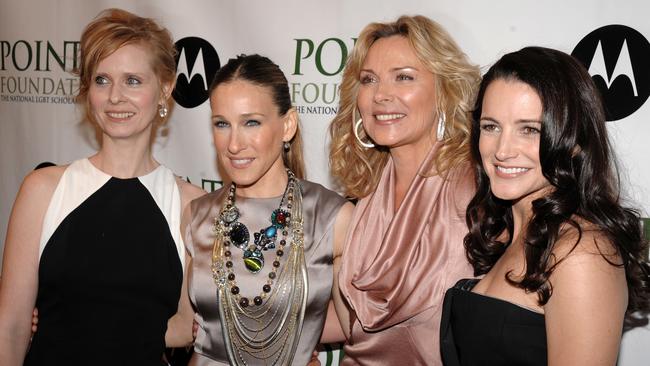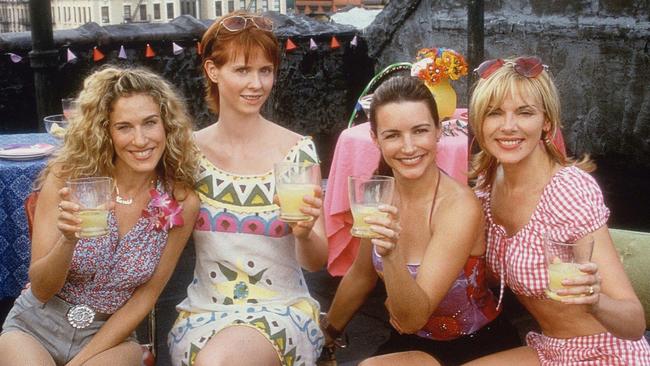Inside the ‘mean girl’ culture that destroyed SATC
WE HAD heard rumours of a rift between the stars of Sex And The City for years. Now one fiery public outburst has brought it all out into the open.
TENSIONS between Sex And The City’s stars have been simmering for years, but thanks to one brutal public take-down, the whole ugly feud has been laid bare for the world to see.
There’d been (loud) whispers of a mutual dislike between Sarah Jessica Parker and Kim Cattrall for the series’ entire six-year run from 1998-2004, and then again with the production and release of both Sex And The City movies. Once more, we heard the women were at loggerheads when Cattrall was blamed for torpedoing Sex And The City 3 last October.
But now we know for sure.
After the death of Cattrall’s brother last week, the actor took to social media to thank fans for their well-wishes. Underneath it, Parker commented: “Dearest Kim, my love and condolences to you and yours and Godspeed to your beloved brother. Xx.”
The seemingly innocent gesture set off a furious response from Cattrall, who published a fiery post branding her former co-star “cruel” and accused her of “exploiting our tragedy in order to restore your ‘nice girl’ persona”.
But perhaps most interestingly, she included a link to a New York Post article from last October, detailing the “mean girls” culture that destroyed the Sex And The City franchise.
With Samantha Jones’ endorsement, it’s definitely worth another read:

LAST week, Sarah Jessica Parker squashed dreams with a sharpened stiletto heel when, out of the blue, she released a statement confirming that there would be no third Sex And The City movie: “I’m disappointed. We had this beautiful, funny, heartbreaking, joyful, very relatable script.”
Parker, notoriously self-conscious about her nice-girl image, didn’t point fingers — but she didn’t have to.
That same day an anonymously sourced article ran in the Daily Mail, which blamed Parker’s former Sex And The City co-star Kim Cattrall and her “demands” for killing the movie.
Cattrall tweeted the next day: “Woke 2 a @MailOnline [poo emoji] storm! The only DEMAND I ever made was that I didn’t want to do a 3rd film….& that was back in 2016.”
But the floodgates had opened, and articles were pumped out about the death of the movie, quoting other Sex stars and producers who confirmed that the movie was over and what an awful thing that was for fans. (Don’t forget to pity the movie studio and executive producer Parker, who made millions on the first two films.)
Within 24 hours, Cattrall was, once more, the villain.
Having once been the deputy editor of Page Six for 10 years, I was familiar with this pattern. Before each of the previous Sex movies, reports would inevitably surface that production was being held up by Cattrall’s salary demands. A flurry of press would follow, Cattrall would capitulate (presumably with a fatter check than previously promised) and the movies were made.
“Same s**t, different day,” a friend of Cattrall’s told me this week.
But this time, unlike all the other times she’d been made to look like a diva, Cattrall didn’t take it lying down. She booked an interview with British talk show host Piers Morgan, took her gloves off, and let it rip.
“The answer was always no,” said Cattrall. “I never asked for any money, I never asked for any projects. To be thought of as some kind of diva is ridiculous.”
She told Morgan that she had no idea when she last spoke to her co-stars, and that no one had approached her when the reports began circulating about her holding up the film.
“Nobody ever picks up the phone and tries to contact you and say, ‘How you doing?’ That would have been the way to handle it,” she added. “This is, it feels like, a toxic relationship.”
While some people were shocked, this nail in the coffin — for the franchise and the relationship between Cattrall and Parker — was a long time coming. And it has everything to do with jealousy, rivalry and money.
To understand what really happened, you have to go back to the beginning. When Sex And The City first debuted on HBO in 1998 it was a game changer, and the four main characters — Carrie, Samantha, Miranda and Charlotte — became part of the lexicon. On-screen they were best friends; off-screen, it was a different story.
Cattrall, who signed on as man-eater Samantha, was arguably the biggest name among the cast in the beginning. She was a bona fide movie star, having headlined Mannequin and Big Trouble In Little China.

According to a 2008 book proposal shopped by Clifford Streit, the real-life inspiration for the show’s character Stanford Blatch, tensions on set began because Cattrall was “a natural comedienne, and a scene-stealer in the best possible sense — the camera went right to her”.
This was, it seems, a problem, given that Parker was playing the show’s heroine, Carrie. A clique began to form, leaving Cattrall out in the cold.
Parker and Cynthia Nixon (Miranda), who’d known each other since their days as pre-teen Broadway actors, gravitated towards each other and pretty quickly included co-star Kristin Davis (Charlotte) in their group. For the first couple of years, Cattrall had a real ally on set in the form of series creator and producer Darren Star. But when he left after the second season and was replaced by Parker’s friend Michael Patrick King, Cattrall was completely isolated.
Page Six reported how, during an Atlantic City, NJ, location shoot, “Sarah Jessica rented a house for herself, Kristin Davis and Cynthia Nixon. Kim was left out on her own.”
(An HBO spokesman said, “Kim stayed in a different house because she was married at the time, and her husband was supposed to come.”)
Running up to the end of the series, there were stories filtering into Page Six almost weekly about the onset tensions. By the end, no one would talk to Kim. “Not even in the make-up room,” one insider said.
Cattrall reluctantly signed on for the first movie in 2007, but as a friend of hers told the Daily News, “Kim does not want to ... do the film. She feels she has been treated horribly by Sarah Jessica Parker for six years.”
Despite the tension, the movie was a hit — making a whopping $US415 million worldwide. Producers, including Parker, were eager to replicate the financial boon and wanted to make a second movie as soon as possible, but Cattrall held back. Soon, gossip started circulating about her “diva demands”. She eventually signed on, after demanding, and receiving, more money.
The actor’s friend recalled to me: “There was a disparity between what Sarah got and what the other girls got. Everyone loved Kim’s character, people related to her — and [Kim’s] salary wasn’t showing that.”
Even with more money, by the time filming started, things were awkward.
According to a 2009 article in New York magazine: “Sarah Jessica Parker and Kim Cattrall are no longer speaking, which is making everyone on the set of the new Sex And The City movie uncomfortable.”
While Parker’s publicist always denied there were any issues between the women, Parker admitted to clashes on set to Marie Claire in 2010, saying: “Sometimes feelings get hurt.” (Representatives for Parker, Davis and King declined to comment, while Nixon and Cattrall’s reps did not get back to me.)
Since then, Cattrall has moved on, spending more time in Toronto and London. One thing’s stayed the same: She doesn’t stay in touch with her SATC co-stars.
“The common ground that we had was the series and the series is over,” Cattrall told Morgan. “Sarah Jessica, she could have been nicer, she could have in some way. I don’t know what her issue is, I never have.”
So Sex And The City is dead and it’s probably for the best for everyone — Cattrall, most of all.
As Cattrall’s friend told me: “When an actress doesn’t do a [sequel], it’s because of two things: respect and compensation. Now it looks like it’s ego. But it’s not that. She just didn’t want to do it.”
This week, some 19 years after the show debuted, Cattrall, now 61, told Morgan, “This is what my 60s are about: They’re about me making decisions for me. Not my career, for me. And that feels frickin’ fantastic.”
Good for you, Kim.



